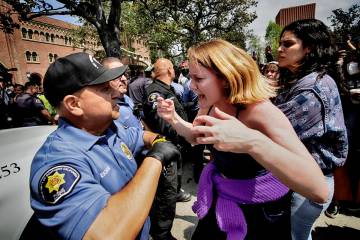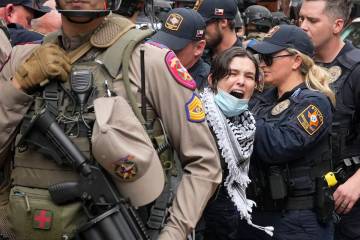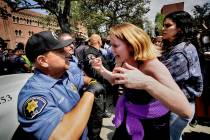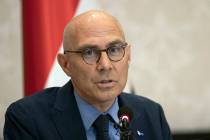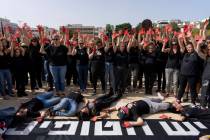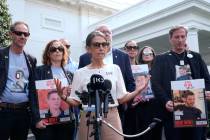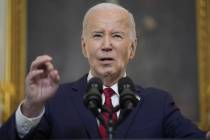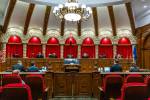High court upholds Nevada ethics law
WASHINGTON -- Efforts to prevent officials from casting votes where they might have a conflict of interest got a boost Monday when the U.S. Supreme Court said voting is not covered by the First Amendment.
The court rejected a Nevada Supreme Court decision that found the state's ethics law was overbroad because it held that voting by public officials on public issues is protected speech under the Constitution.
The matter will return to the state's highest court to reconsider the constitutionality of Nevada's far-reaching recusal law.
"The court will have to take a look at it and decide how to proceed," Nevada Supreme Court Clerk Tracie Lindeman said.
The case was widely followed by government watchdog groups and news organizations worried that the Nevada court decision, if upheld, could harm government accountability.
The Las Vegas Review-Journal joined 15 other news organizations and press freedom groups in a brief supporting the Nevada Commission on Ethics.
Lucy Dalglish, executive director of the Reporters Committee for Freedom of the Press, said she hopes the Supreme Court decision will blunt efforts by some elected officials to use the Nevada state decision as a shield against transparency in government.
If the Supreme Court had upheld the Nevada ruling, Dalglish said there would have been "a crumbling all over the country" of open meeting laws, leaving the public in the dark about public issues under debate by elected officials.
The state ethics panel greeted Monday's decision with "welcomed relief," Executive Director Caren Jenkins said.
"What the court found is that legislative voting is not speech at all. It is an action, and those actions are not protected by the First Amendment," Jenkins said. "Therefore requiring recusal is permissible if it falls within the definition of a conflict of interest per Nevada law."
The case involved a vote that Sparks City Councilman Michael Carrigan cast in 2006 in favor of the Lazy 8 casino project. The Nevada Ethics Commission later censured Carrigan, saying he had a conflict of interest because his friend and campaign manager, Carlos Vasquez, was a paid consultant on the project.
Carrigan, who still is on the council, said Monday that he hopes the state court will find another reason to strike down the recusal law because it is too vague.
The Nevada law prohibits elected officials from voting on issues where a family member, business associate or "substantially similar" relation has a private interest in the vote.
Josh Rosenkranz, who represented Carrigan before the Supreme Court, said he fully expected the court would reject "the broad rationale of the Nevada Supreme Court" but had hoped it would consider his alternative arguments for rejecting the law.
Rosenkranz had stressed during oral arguments in April that the censure was tantamount to an attack on political relationships that are a foundation of democracy.
John Elwood, an attorney for the Ethics Commission, said the U.S. Supreme Court decision would make it more difficult for the Nevada court to reject the state's ethics law. "It certainly gives legislatures more leeway in adopting recusal rules because it is clear they don't implicate free speech," he said.
As for the vagueness issue, Elwood said the Nevada recusal law has been around for a decade and has not been broadly interpreted to apply to campaign volunteers.
Justice Antonin Scalia, writing for the high court, said the Nevada Supreme Court erred in finding that recusal rules violated legislators' First Amendment rights. Casting a vote "is not personal to the legislator but belongs to the people; the legislator has no personal right to it," Scalia wrote.
Scalia also drew a distinction between acts, such as flag burning, that convey a symbolic meaning and are therefore protected, and votes cast by elected officials.
"The act of voting symbolizes nothing," he wrote. "It discloses, to be sure, that the legislator wishes that the proposition on the floor be adopted, just as a physical assault discloses that the attacker dislikes the victim. But neither the one nor the other is an act of communication."
Justice Samuel Alito agreed that the case should be overturned because of the nation's long history of supporting recusal laws to avoid conflicts of interest. But, he disagreed that voting is not a form of speech. Alito said that the nation has a rich history of lawmakers, including John Quincy Adams and Sam Houston, who cast votes that express deeply held views.
Justice Anthony Kennedy agreed with the majority but wrote a concurring opinion that suggested the state law might impose a substantial burden on the ability of lawmakers and voters who support them to communicate.
Contact Stephens Washington Bureau reporter Peter Urban at purban@stephensmedia.com or 202-783-1760.
Read the Supreme Court ruling.




